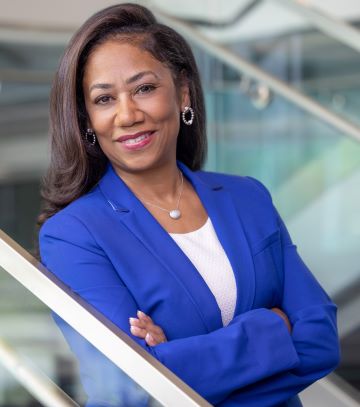ACCP Staff
ACCP’s President and CEO is excited to speak with one of our newest board members, Deidra Parrish Williams. Deidra is the Director of Global Corporate Social Responsibility & Community Affairs at Trane Technologies and the Executive Director of the Trane Technologies Foundation.
How did you get your start in corporate citizenship?
I started my career as a journalist, and after about a decade, I transitioned into corporate communications and PR, where I was introduced to CSR work. It was an instant love affair. I took a deep dive into coursework that helped me develop a deeper knowledge of its history and the issues influencing its evolution, all of which helped me to create innovative CSR programs and lead effective strategies in several companies.
There was a brief period where I left corporate citizenship for a role I was really attracted to — a strictly communications role at a brawny global insurance outfit on Wall Street. It was my first global role, and it checked some of my boxes, but boy, it was a big miscalculation that taught me a valuable lesson, which is that if I’m going to work hard, and I will, then I want it to be in ways that provide benefit to society.
The field continues to evolve. What are the most important skills and knowledge corporate social impact professionals need to be successful?
I think people are often drawn to corporate citizenship work because it feels rewarding, but feelings do not rule the day. It’s essential to keep your strategic value proposition in sharp focus. Corporate citizenship is a thoughtful exchange between a company and its public in which both parties must give and receive value. For corporate citizenship to thrive, it needs to be clear how it returns value to the organization. Otherwise, its sustainability is compromised.
When working in global markets, it’s also essential to maintain insights about how the local people and governments view and respond to corporate citizenship. It can vary significantly from one region to another. The Asia Pacific market has unique attitudes and approaches from Europe, and likewise for Latin America.
What advice or lessons learned do you most often share with members of your team or other CSR professionals?
Everything is branding. Everyone who engages with our company — whether they are employees, job candidates, shareholders, or customers — is trying to decide whether we are a worthwhile investment of their time or money. While corporate citizenship is designed to create uplift and opportunity, it also significantly impacts our brand health.
When our stakeholders see or learn about our corporate citizenship commitments, it helps answer the subliminal question they routinely ask themselves: “Is this company worth my investment?” Done well, our work should help ensure that their answer is “yes!”
What is one specific piece of advice you received that has served you well in your professional journey?
Looking to build buy-in or establish teams, relationships end up being very important, so it’s vital to “operate both vertically and horizontally” at the same time. Leveraging leaders across various business divisions is essential for collaborating, generating influence, and cascading messages.
However, remember that engagement occurs deep within the organization, so it’s critical to be deliberate about maintaining strong connections at both ends.
Considering the current landscape corporate social impact professionals are working in, what are the essential things you suggest for them to make a priority?
There are a few things that feel important right now. One is advocacy. Even as corporate citizenship has evolved and gained more validity through the ESG model, it’s still necessary to consistently demonstrate its strategic value, especially as we see pushback among various stakeholders around the value of DEI work and the validity of ESG reporting.
Relatedly, relationship-building is critical. Having internal champions across the organization who can collaborate, enrich outcomes, and help articulate the value corporate citizenship provides helps build resonance for the work.
Who’s someone you admire and why?
I tend to feel the greatest admiration for people who have summoned the fortitude to win in the face of significant odds, so I admire many people. Some I know and some who are only friends in my head – from my grandfathers who had very modest upbringings and worked odd jobs for pocket change as young men but went on to build solid careers that left substantial legacies for their families to courageous change agents like Barack Obama and Mamie Till.

